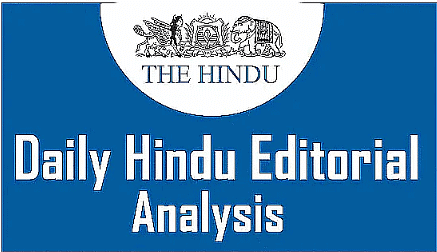UPSC Exam > UPSC Notes > Current Affairs & Hindu Analysis: Daily, Weekly & Monthly > The Hindu Editorial Analysis- 30th March 2024
The Hindu Editorial Analysis- 30th March 2024 | Current Affairs & Hindu Analysis: Daily, Weekly & Monthly - UPSC PDF Download

Bonds, Big Money and an Imperfect Democracy
Why in News?
The electoral bonds scheme that has been declared unconstitutional by the Supreme Court of India, was supposed to end the financing of elections with black money. If this had happened, Indian politics would have been transformed with great benefit to the nation.
Introduction of Electoral Bonds in India
An important development in India's electoral funding landscape occurred with the introduction of electoral bonds. This initiative was brought about to address the issue of transparency and accountability in political party financing.
Background
- In an amendment to the Income Tax Act, the permissible amount of cash donations from anonymous sources to political parties was reduced significantly, from Rs 20,000 to Rs 2,000.
Key Features of Electoral Bonds
- Transparency: The primary objective behind the introduction of electoral bonds was to enhance transparency in the funding of political parties during elections. This measure aimed to make the process more accountable and open to public scrutiny.
- Anonymity: Electoral bonds ensure that the identity of the donor remains confidential. This anonymity protects donors from potential repercussions and safeguards their privacy.
- Easy Funding: One of the significant advantages of electoral bonds is that they provide a convenient way for ordinary citizens to financially support the political parties of their choice. This mechanism encourages broader participation in the democratic process.
In summary, electoral bonds were introduced as a mechanism to promote transparency, protect donor privacy, and facilitate greater public engagement in the funding of political parties.
Why have electoral bonds attracted criticism?
- Lack of transparency: Electoral bonds have faced criticism due to the anonymity they provide to donors, which undermines transparency in political funding.
- Influence of corporate interests: Critics argue that electoral bonds can be misused by corporates to influence political parties in exchange for favors.
- Impact on democracy: There are concerns that electoral bonds could lead to increased corruption and weaken the democratic process by allowing undisclosed funding.
- Legal loopholes: Critics point out loopholes in the legal framework governing electoral bonds, raising questions about accountability and oversight.
- Unequal playing field: Some argue that electoral bonds favor ruling parties and create an uneven playing field by giving them an advantage in fundraising.
- Anonymity: Critics argue that the anonymity of electoral bonds primarily benefits the general public and opposition parties. Selling bonds through a government-owned bank like SBI raises concerns as it can potentially reveal the donors funding the opposition.
- Privacy: The privacy of the donor is compromised since the bank will have access to their identity.
- Unfair Advantage : There is a risk that the government may coerce contributions from big companies or retaliate against those who do not support the ruling party, creating an unfair advantage for the party in power. Over 75% of electoral bonds have been directed to the party in power at the national level.
- Nexus: Electoral bonds provide another channel to strengthen the questionable connections between corporate entities and political organizations.
- Higher Denominations: While electoral bonds were intended to enable ordinary citizens to support political parties easily, more than 90% of bonds have been issued in the highest denomination of Rs 1 crore.
- Cap on Donation: Prior to the introduction of electoral bonds, there existed a limit on corporate donations to political parties based on a percentage of the company's profits. This restriction was eliminated by amending the Companies Act, allowing unlimited corporate contributions. Even companies operating at a loss or acting as shell corporations can now utilize electoral bonds for funding.
- Opacity: Companies contributing via electoral bonds are not obligated to maintain records of such donations under Section 13A of the IT Act, leading to financial transactions being shrouded in secrecy. The RPA Act has been modified to exempt political parties from reporting donations exceeding Rs 2,000 if received through electoral bonds, resulting in a lack of financial transparency.
- Foreign Funds: Changes to the Foreign Contribution Regulation Act have exempted political parties from scrutiny of foreign funds received, dating back to 1976.
- Black Money: Modifications to the Companies Act permit foreign companies registered in India to contribute funds to political parties through bonds, despite uncertainties regarding their true owners.
Petition Against Electoral Bonds Scheme
- An NGO called the Association for Democratic Reforms lodged a Public Interest Litigation (PIL) in 2017. The PIL addressed concerns regarding corruption and the undermining of democracy due to illegitimate and foreign financing of political parties. Additionally, it highlighted the lack of transparency in the financial records of all political parties.
- Before the assembly elections in West Bengal and Assam, the NGO filed an interim application in March of that year. The request was to prevent the reopening of the sale of electoral bonds, citing potential issues.
- The NGO raised allegations based on data from 2017-18 and 2018-19 related to electoral bonds. The data suggested that the ruling party had received over 60% of all issued electoral bonds up to that point.
- In 2019, the Supreme Court instructed political parties to disclose all information about funds received through electoral bonds to the Election Commission in a sealed envelope, in response to the EC's affidavit.
- In January 2021, the apex court declined to impose a temporary halt on the scheme. Instead, it requested responses from the Union government and the Election Commission.
The document The Hindu Editorial Analysis- 30th March 2024 | Current Affairs & Hindu Analysis: Daily, Weekly & Monthly - UPSC is a part of the UPSC Course Current Affairs & Hindu Analysis: Daily, Weekly & Monthly.
All you need of UPSC at this link: UPSC
|
38 videos|5258 docs|1111 tests
|
Related Searches
















